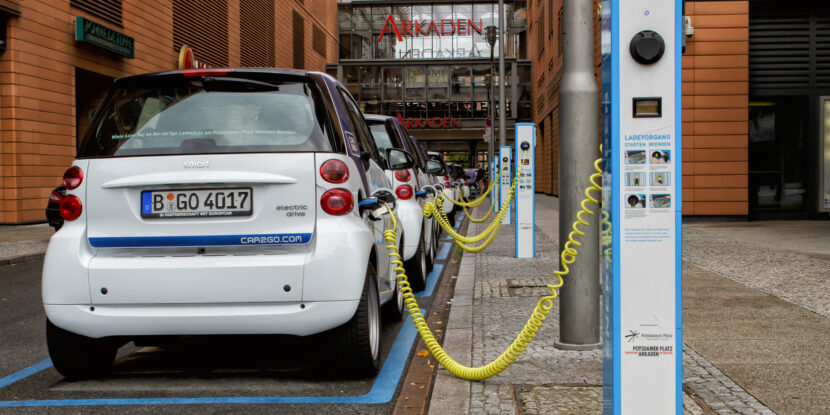
PULSE POINTS:
❓What Happened: Discounts on electric vehicles in Germany increased in April, with average markdowns reaching 16.7 percent. The consumer incentives come as the European auto industry is under increasing pressure to boost sales in order to help meet European Union (EU) carbon emissions targets.
👥 Who’s Involved: European auto dealers, consumers, and the European Union.
Your free, daily feed from The National Pulse.
📍 Where & When: Germany, April 2025.
💬 Key Quote: “In April, the threshold for offering higher discounts on electric vehicles has fallen,” said auto industry expert Ferdinand Dudenhöffer.
⚠️ Impact: The price gap between electric vehicles and conventional cars has narrowed, hinting at a potential artificial upswing in the EV market.
IN FULL:
In Germany, discounts on electric vehicles (EVs) saw a notable increase in April, with the average markdown rising to 16.7 percent, according to automotive expert Ferdinand Dudenhöffer. This marks an increase of 1.8 percentage points from March. Since the beginning of the year, EV discounts have risen by three percentage points, translating to savings of over €1,000 (~$1,135) on typical models.
Dudenhöffer’s analysis focused on online prices for the 20 most popular fully electric cars in Germany. He noted, “In April, the threshold for offering higher discounts on electric vehicles has fallen,” suggesting that further price reductions could be expected in the near future.
The push for increased EV sales is driven by the need for carmakers to meet European Union CO2 targets. Some brands have adjusted their distribution strategies, reviving dealer incentives and promotional campaigns to counter weak demand. In contrast, discounts for traditional internal combustion engine vehicles and plug-in hybrids saw a slight decline in April and have not increased as much as EV incentives since January.
As a result, the price gap between electric vehicles and conventional cars has narrowed to its lowest level since Germany discontinued state-funded EV subsidies. Dudenhöffer believes this could signal a “new upswing driven by more attractive pricing” in the German electric vehicle sector. Following a decline in 2024 due to the expiration of government subsidies, new EV registrations in Germany rebounded in the first quarter of 2025.

PULSE POINTS:
❓ What Happened: The Atlantic quietly edited a hit piece smearing Joe Kent, Trump’s nominee for Director of the National Counterterrorism Center, after falsely suggesting his ‘panzer’ (‘tank’ in German) tattoo was a Nazi dogwhistle. The National Pulse produced evidence that he served in an anti-tank unit and has a matching ‘jäger’ (‘hunter’) tattoo.
👥 Who’s Involved: Joe Kent, The Atlantic writer Ali Breland, The National Pulse Editor-in-Chief Raheem Kassam, and the Office of the Director of National Intelligence (ODNI).
Your free, daily feed from The National Pulse.
📍 Where & When: Online, with edits made to The Atlantic’s article in May 2025.
💬 Key Quote: “After this story was published, The National Pulse… released a photo featuring a man with a jäger tattoo on his right arm whom Kassam identifies as Kent,” The Atlantic’s edited article states.
⚠️ Impact: The controversy exposes media bias and sloppy reporting, undermining The Atlantic’s credibility and partisan efforts to discredit President Trump’s nominees.
IN FULL:
The Atlantic has edited its Who Gets Panzer Tattooed on Their Arm? hit piece on Joe Kent, President Donald J. Trump’s nominee for Director of the National Counterterrorism Center, which smears the war veteran for having a tattoo reading ‘panzer’—German for ‘tank’—on one of his arms.
Writer Ali Breland suggested the tattoo may be a Nazi dogwhistle, dismissing social media users who cautioned that U.S. servicemen in anti-tank roles often have the words ‘panzer’ and ‘jäger’ tattooed on each arm, for ‘tank hunter.’ This was popularized in the U.S. Army after the Second World War, as Americans were posted to West Germany—a NATO ally—to face off against Soviet forces.
Breland’s article originally stated he “couldn’t find any evidence that Kent was part of an anti-tank unit… or that he even has a jäger tattoo on his other arm.” However, Raheem Kassam, Editor-in-Chief of The National Pulse, soon produced photographic evidence that Kent does have a matching ‘jäger’ tattoo, and did serve in an anti-tank section of the 2nd Ranger Battalion from 1998 to 2001—forcing The Atlantic to edit Breland’s hit piece.
“After this story was published, The National Pulse, a right-wing website founded and operated by the Steven Bannon ally Raheem J. Kassam, released a photo featuring a man with a jäger tattoo on his right arm whom Kassam identifies as Kent,” the article now reads, as if the image published by The National Pulse—in which Kent’s face is clearly visible—is somehow open to question. “I reached out to both Kent and ODNI to inquire about the photo’s authenticity, but did not immediately hear back,” the edit adds, further trying to muddy the waters.
The image, as seen below, is clearly Kent:

Even more disingenuously, the section of the article in which Breland notes he “couldn’t find any evidence that Kent was part of an anti-tank unit” has been altered—with no editor’s note to inform readers of the alteration—to state that “Kent was part of a battalion that, in part, did anti-tank work.”
As of the time of publication, the only editor’s note attached to the doctored article simply states, “This article previously misstated the name of Alexa Henning, a deputy chief of staff at the Office of the Director of National Intelligence. It has been updated to include additional context about Joseph Kent’s military service.”
show less

 1 month ago
5
1 month ago
5








 English (US) ·
English (US) ·